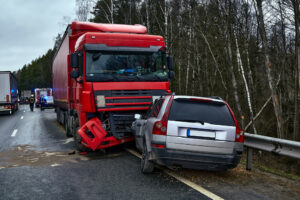Why Is the Black Box Important in Truck Accidents?
Posted on March 2022
 If you or a loved one has been involved in an accident with a commercial truck that wasn’t your fault and has suffered severe injuries, you may be entitled to compensation. Personal injury cases for truck accidents can be complex. An experienced personal injury attorney can help you receive fair compensation. Our experienced law firm can provide a free consultation to you in order to review your case.
If you or a loved one has been involved in an accident with a commercial truck that wasn’t your fault and has suffered severe injuries, you may be entitled to compensation. Personal injury cases for truck accidents can be complex. An experienced personal injury attorney can help you receive fair compensation. Our experienced law firm can provide a free consultation to you in order to review your case.
Your Personal Injury Case
After a trucking accident, you need an advocate to help you receive justice while you are focusing on your recovery. Part of our time working on your case will be spent conducting an investigation into your accident. The purpose of the investigation is to determine who acted negligently and caused the accident. We will also collect evidence in your case, such as the “black box” installed in many commercial trucks.
What Is a Black Box?
A black box is an electronic logging device, or ELD. As the name implies, the electronic device is attached to a commercial vehicle’s engine. The engine automatically sends data to the ELD. This data includes information about the status of the vehicle and engine, including when the engine is running and the movement of the vehicle. This provides a record of the driver’s drive time and the number of miles they’ve driven. The ELD is essentially an electronic version of a driver’s travel log. All ELD’s must be compliant with the specifications provided by the Federal Motor Carrier Safety Administration (FMCSA).
Why Is the Black Box Important?
Finding the cause of the trucking accident is integral in helping you receive the justice you deserve. Your entitlement to compensation is based on the trucker’s negligence. As part of our investigation into your accident, we will collect evidence to prove that the trucker’s actions caused the accident that directly caused your injuries. The truck’s black box is important evidence in your case. Because it contains considerable information regarding the truck driver’s hours of service and the status of the truck, it may help us determine whether the truck driver had exceeded their maximum hours of service at the time of the accident and how the truck was being operated leading up to the accident. This all helps us understand if and how the truck driver or their employer may have been negligent leading up to the accident.
Rules for Truck Drivers
 Truck drivers and commercial trucking companies must follow a number of regulations and laws, separate from those required for normal passenger vehicle drivers. These regulations exist to maintain the safety of truck drivers and other people traveling on the roads and highways. An agency within the United States Department of Transportation — the FMCSA — regulates truckers and trucking companies and conducts oversight to ensure compliance.
Truck drivers and commercial trucking companies must follow a number of regulations and laws, separate from those required for normal passenger vehicle drivers. These regulations exist to maintain the safety of truck drivers and other people traveling on the roads and highways. An agency within the United States Department of Transportation — the FMCSA — regulates truckers and trucking companies and conducts oversight to ensure compliance.
Truck drivers are required to undergo extensive training and maintain detailed accounts of their driving hours and mileage. Trucking companies are required to perform frequent and routine maintenance on their fleet of trucks.
One of the most important FMCSA regulations is the one that stipulates the maximum number of hours a trucker can drive. Known as hours of service, or HOS, these regulations govern on-duty hours to minimize driver fatigue, which is a potential cause of trucking accidents.
In 2012, the Moving Ahead for Progress in the 21st Century (MAP-21) law was passed to support the FMCSA’s regulation and oversight of the trucking industry. Among the new rules was a provision requiring the use of black boxes in all commercial vehicles (with limited exceptions).
Compensation for Truck Accident Injuries
If you are injured in a truck accident, and the truck driver is found to be responsible for the accident, the truck driver and/or his employer may be ordered to compensate you.
You may be entitled to several forms of compensation:
- Economic damages – These damages include compensation for your loss of income and reimbursement for your medical bills. Economic damages also include payment for your future medical needs related to the injuries you sustained in the accident, as well as the cost to repair or replace personal property damaged in the accident.
- Noneconomic damages – These damages include compensation for the pain and suffering you have endured as a result of the accident. You may also be compensated for any decline in your quality of life.
- Punitive damages – These damages, while rarely awarded, can be considerable and are meant to punish the person or entity that caused your accident. You may be entitled to receive punitive damages if the person who caused the accident acted with malice, committed fraud, or with willful and wanton conduct.
Call Us Today
Our attorneys at DeMayo Law Offices have nearly three decades of experience handling personal injury cases. Our attorneys will fight for you to receive justice and fair compensation. If you’ve been injured in an accident with a commercial truck that wasn’t your fault, contact us at (877) 333-1000 or chat with us online today.
We operate on a contingency-fee-basis. That means you pay nothing upfront, and we don’t get paid until you do. Call us at (877) 333-1000 or contact us online today for your free consultation.